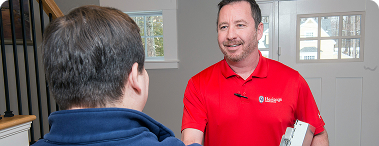If your well water has any risk of bacterial contamination, a UV (ultraviolet) filter is one of the most effective safeguards you can install. Many private wells do contain microbes. One nationwide study found that about one-third of tested wells had some form of bacterial contamination.
If your well hasn’t been recently tested or has a history of coliform or E. coli bacteria, then yes, a UV disinfection system is highly recommended to ensure your water is safe to drink. UV water treatment uses powerful ultraviolet light to destroy microorganisms on contact, neutralizing up to 99.99% of harmful bacteria, viruses, and other pathogens in the water. In other words, it kills germs without chemicals, making it an excellent solution for private wells.
On the other hand, if your well has consistently tested clean for bacteria and is well-protected from contamination sources, a UV filter might not be strictly “necessary.” However, many homeowners still choose to install UV purification for peace of mind. It’s a relatively affordable, low-maintenance insurance policy to guard your family against any surprise contamination in your well water.
Unless you’re absolutely certain your well water will never contain bacteria (it’s tough to be sure of that!), a UV filter is a smart addition to your water system for safety and peace of mind.
How UV Water Disinfection Works
Ultraviolet water disinfection is a chemical-free treatment that inactivates microorganisms by exposing them to UV light. A typical UV well water purifier consists of a stainless steel chamber housing a special UV lamp. As water flows through the chamber, it’s bathed in UV-C light (around 254 nm wavelength), which damages the DNA of microbes like bacteria, viruses, and protozoa. This prevents the organisms from reproducing or causing infection, effectively “killing” them. The process is rapid: As soon as the water passes the lamp, about 99.99% of the germs are neutralized.
Importantly, UV treatment does not add anything to the water. There are no chemicals involved and no residues left behind. The UV light itself never leaves the sealed chamber, so it won’t harm you or change the taste or odor of the water.
Once treated, the water is immediately ready for use. The system typically runs 24/7, ensuring any water drawn from your well is disinfected in real time. Because this ultraviolet light filtration process is purely physical, it’s safe and compatible with other water treatment steps; in fact, UV is often the final step in a whole-house well water filtration setup.
When Do You Need a UV Filter for Well Water?
Not every well requires UV treatment, but there are key situations where it becomes necessary or highly beneficial. First and foremost, if your well water tests positive for bacteria—particularly coliform or E. coli—this signals that your water isn’t safe without disinfection.
Health authorities recommend annual bacterial testing, and if contamination is detected, a UV filter is one of the most effective solutions for ongoing protection. While methods like shock chlorination can temporarily eliminate bacteria, they don’t prevent future contamination. UV systems continuously neutralize microbes each time water is used, providing reliable long-term safety.
Additionally, if your well is shallow, older, or vulnerable to contamination due to its location or surroundings, a UV filter is strongly recommended. Shallow wells, artesian wells near the surface, or wells located near farms, septic tanks, or wildlife habitats face higher risks, especially duringthe heavy rainfall or seasonal flooding common in New England.
If your well is newly drilled, well-sealed, and unlikely to experience contamination, regular testing may suffice. However, because water quality can change unexpectedly, a UV system offers “automatic insurance” against future microbial issues.
Considering the relatively modest cost of UV units—especially compared to potential health risks or drilling a new well—many homeowners find UV filtration an affordable way to ensure ongoing water safety and peace of mind.
Contaminants UV Filters Remove (and What They Don’t)
UV filtration is specifically designed to neutralize living organisms in water. This includes:
- Bacteria (like coliform, E. coli, salmonella)
- Viruses (such as norovirus or hepatitis A)
- Protozoan cysts (like Giardia lamblia and Cryptosporidium)
These microbes are the primary health concern for well water disinfection, and UV light is very effective against them. In fact, UV is known to inactivate even chlorine-resistant parasites like Giardia and Cryptosporidium that chemical treatments can struggle with.
By installing a properly sized UV system, you can reliably achieve a 99.99% reduction of disease-causing microorganisms in your well water. This leaves your water biologically safe to drink, cook with, and bathe in.
What UV Light Doesn’t Filter
However, it’s equally crucial to know what UV does not remove. UV light does not filter out any chemicals, metals, or sediments in the water. Its role is disinfection, not physical filtration. So while a UV lamp will handle the germs, it won’t affect the presence of iron, manganese, arsenic, sulfur, nitrates, PFAS, hardness minerals, or any other non-living contaminants that might be in your well.
For example, many New England wells have issues like arsenic or high iron content. UV treatment alone won’t solve those. You would need separate filtration (like carbon filters, ion exchange, reverse osmosis, etc.) to remove those impurities. In fact, UV systems are typically installed in combination with other filters.
A common setup for a well is to have a sediment pre-filter and possibly an activated carbon filter or water softener before the UV unit. The prefilter is especially important because UV light needs clear water to do its job. If your water has a lot of turbidity (cloudiness from suspended particles) or iron sediment, those particles can create shadows that allow bacteria to slip through untouched.
The Bottom Line on UV Treatment for Well Water
Ultraviolet water purification often makes the difference between questionable well water and safe, drinkable water. Given how common bacterial contamination can be, UV is a strongly recommended upgrade for most private wells. It’s a straightforward, trustworthy, and effective method to protect your household from waterborne illness without introducing chemicals or complicated procedures.
UV filters excel at providing continuous disinfection so you can trust your well water. They work silently in the background, require little upkeep, and can last for years. When combined with proper testing and any needed pre-filtration, a UV system gives you confidence that your well is delivering clean, healthy water.
If you’re concerned about bacteria in your well or simply want an extra layer of protection, consider talking to a water treatment professional about UV. Heritage Home Service has extensive experience installing UV filtration systems for homeowners throughout New England. We can test your well water, help you determine if a UV purifier is necessary, and ensure the system is properly integrated with any other filters your water needs. Our team will recommend the right size and type of UV unit to match your home’s water usage and make sure you get reliable results.
Don’t wait for a positive bacteria test or a family illness to take action. Reach out to Heritage for honest advice and quality installation of a UV water treatment system. Contact us today to learn how a UV filter can keep your well water clean and your family safe so you can enjoy your private water supply with confidence.

Financing Made Easy
When you choose Heritage, you can rest easy knowing that we provide straightforward options to help you budget for a complete solution that will last you for decades to come.
VIEW FINANCING OPTIONS
Complete Care Plan
With Complete Care, enjoy peace of mind knowing your home's plumbing, heating, cooling, and electrical needs are handled year after year—hassle-free, with added benefits.
VIEW PLAN







